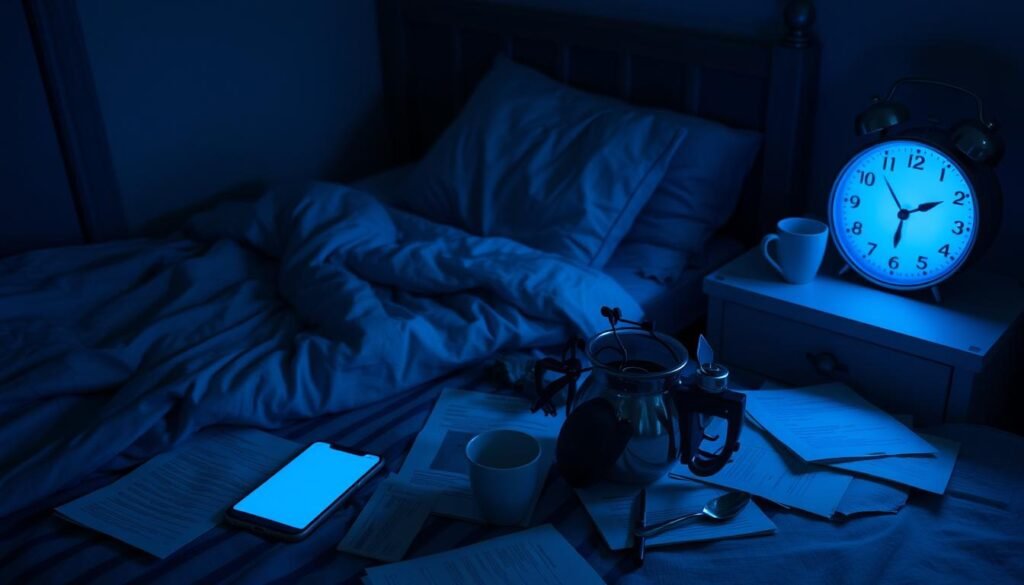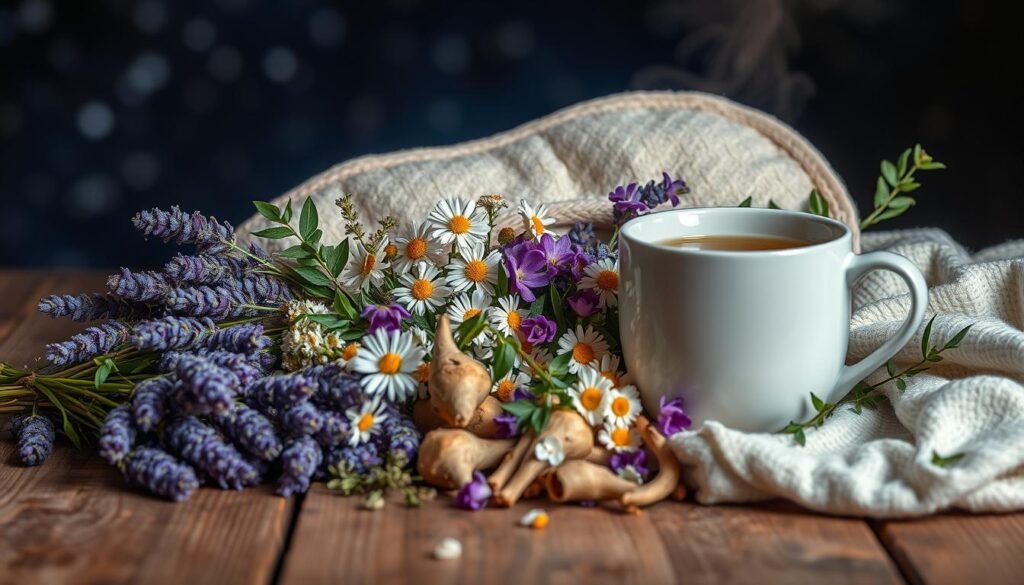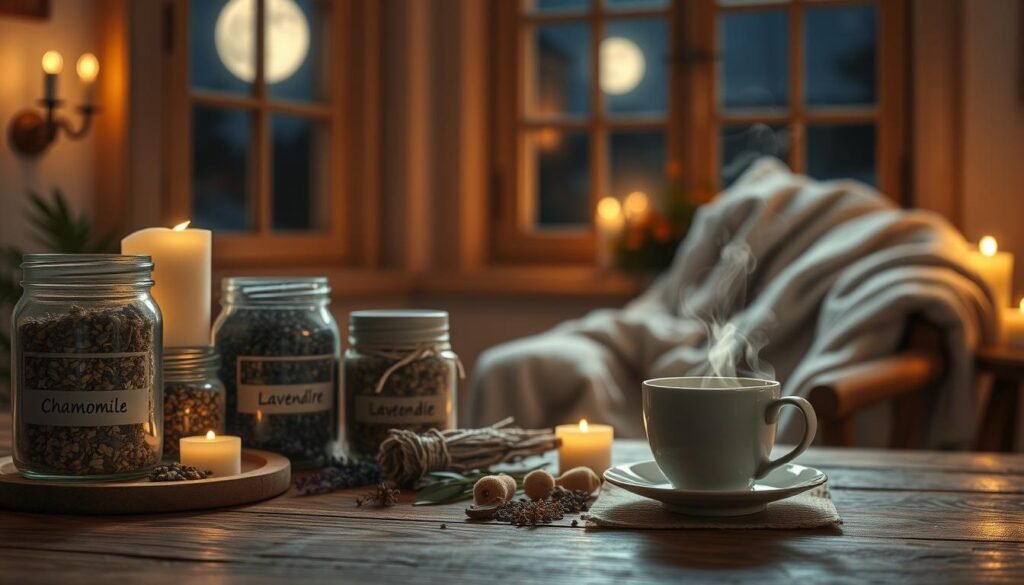About 1 in 5 people in the UK don’t get enough sleep. This worrying fact shows a big problem around the world, mainly caused by stress and anxiety. As people aim for better sleep, mixing wellness and natural sleep solutions is getting more important. Using herbs along with changing how you live can greatly improve sleep quality.
Herbs like chamomile, lavender, and ashwagandha are really good at making you relaxed and bettering your sleep. By adding healthy habits, like exercising and having a peaceful routine before bed, these natural sleep remedies lead to refreshing sleep. This piece will show how to include herbs in your daily routine. It will focus on ways to combine the power of nature with changes in your lifestyle for a better night’s sleep.
Key Takeaways
- Combining herbs with lifestyle changes can effectively enhance sleep quality.
- Common herbs for sleep include chamomile and lavender.
- Regular physical activity can positively impact sleep duration.
- Establishing a calming nighttime routine aids in preparing the body for sleep.
- Avoiding stimulants like caffeine before bedtime is crucial for better rest.
- A structured sleep schedule promotes a natural sleep-wake cycle.
- Consulting a medical professional may be necessary for persistent sleep issues.
The Importance of Quality Sleep
Quality sleep is key to good health and happiness. It’s more than just resting. It’s a time when our body fixes itself, getting ready for the day ahead. Knowing about REM and non-REM sleep is important.
Understanding Sleep Cycles
Sleep is made up of cycles that last about 90 minutes. These cycles move between REM and non-REM sleep. Each part has its own job, like helping with memory or mood. Getting 7-8 hours of sleep is crucial.
Being regular with your sleep patterns helps a lot. It lets your body move through sleep cycles better.
Health Implications of Sleep Deprivation
Not getting enough sleep is bad for you. It can make you stressed, weaken your immune system, and raise your risk of diseases. This includes problems like diabetes and heart disease.
Studies show that 30% to 40% of adults around the world have insomnia. For older adults, the number can be up to 25%. Bad sleep affects more than just feeling tired. It touches every part of your life.
To sleep better, try drinks like chamomile or valerian root. These can help you relax and fall asleep. Learning about the benefits of sleeping well and the risks of not getting enough is a good step. It makes you put sleep first for your health.
Identifying Causes of Sleep Issues
Knowing why you can’t sleep well is key to getting better rest. Many things can cause sleep problems, including both mind and body issues. Understanding these can help you find ways to sleep better.
Common Causes of Insomnia
Insomnia has many triggers. The common ones are:
- Stress and anxiety
- Changes in the environment or routine
- Poor sleeping habits
- Health conditions such as chronic pain or asthma
- Medications, including antidepressants and stimulants
About 49% of American adults might face insomnia at some point. It often comes from stress, lifestyle, and health problems. Knowing these causes helps tackle sleep issues effectively.
The Impact of Stress on Sleep
Stress greatly affects sleep. It can raise cortisol levels, making it hard to fall and stay asleep. Poor sleep can then make stress worse, creating a tough cycle.
Relaxation strategies can help manage this. Cognitive Behavioral Therapy (CBT), for example, can improve sleep and ease insomnia symptoms. Such methods help deal with stress and sleep problems.

Natural remedies might help with insomnia, too. Things like valerian, magnesium, and L-theanine could improve sleep. For more on herbal solutions, check out this research on managing sleep disorders here.
| Cause of Insomnia | Description |
|---|---|
| Stress | Heightened anxiety levels can disrupt sleep patterns. |
| Poor Sleep Hygiene | Irregular sleep schedules can lead to chronic sleep issues. |
| Health Conditions | Chronic pain or respiratory problems may interfere with rest. |
| Medications | Certain prescriptions can cause drowsiness or alertness issues. |
The Role of Herbs in Improving Sleep
Herbs are now popular natural remedies for sleep. They have benefits for better sleep and battling insomnia. People often choose these natural options over drugs. Many plants have calming effects that can help you relax and fall asleep.
Natural Sleep Remedies and Their Benefits
Studies have shown that some herbs help with sleep problems:
- Valerian root is well-known for easing insomnia. It may boost deep sleep by keeping GABA levels high.
- Chamomile is a strong natural solution. In one study, older adults sleeping better after taking chamomile extract for 28 days.
- Lavender, from silexan, works well against anxiety and improves sleep. Its soothing effects are widely appreciated.
- Passionflower, when used with valerian and hops, improves sleep quality. Studies have noted better sleep duration and less insomnia.
These natural remedies do more than ease anxiety. They also help you sleep longer. Adding behavioral strategies can further improve how you view sleep and manage insomnia.
Popular Herbal Sleep Aids: Overview
Many herbs are known to help with sleep. Let’s look at the most popular ones:
| Herb | Key Benefits | Usage Forms |
|---|---|---|
| Valerian Root | Promotes deep sleep, reduces sleep latency | Extracts, teas, dietary supplements |
| Chamomile | Improves sleep quality, reduces anxiety | Teas, extracts, capsules |
| Lavender | Reduces anxiety, enhances sleep quality | Essential oils, teas, extracts |
| Passionflower | Aids in stress relief, improves sleep duration | Teas, extracts, capsules |
| Hops | Induces sleep, reduces insomnia severity | Teas, extracts, capsules |
Knowing about herbal remedies helps people make good choices for sleep aid. These natural options offer hope for better sleep, which is great for those seeking restful nights.

Blending Herbs with Lifestyle Changes for Better Sleep
Getting better sleep can really help you feel good overall. Adding herbs into your daily routine can be a smart way to get more restful nights. Mixing lifestyle changes with these herbs can be a strong move for anyone who finds it hard to sleep well.
Creating Effective Herbal Blends
Selecting the right herbs that work well together is key. For example, valerian is great for making you fall asleep faster and improving your sleep. When you add hops to it, the two can work even better together as studies show. Adding soothing chamomile into the mix brings another level of calm. It shows why putting together the right herbs for each person is important.
Integrating Herbs into Daily Routines
Making herbs a regular part of your day is important to really see their benefits. Drinking herbal teas, using tinctures, or taking capsules can change your sleep for the better. Like, having chamomile tea before bed can be a relaxing habit. Creating a bedtime routine that includes herbs can help your mind and body get ready for sleep. Paying attention to what works for you and mixing it with other lifestyle changes for better sleep can lead to better rest and health.

| Herb | Main Benefits | Considerations |
|---|---|---|
| Valerian | Reduces sleep latency, improves sleep quality | Mild adverse effects may occur, consult healthcare provider if on sedatives |
| Hops | Modest improvements in sleep quality when combined with valerian | Potential interactions with sedatives or alcohol |
| Chamomile | Promotes relaxation and better sleep | None typically reported, safe for most |
| Cinnamon | May enhance melatonin and serotonin levels | Moderation advised to avoid upset stomach |
| Cardamom | Contains phytomelatonin, may support sleep | Chai may not be ideal for bedtime |
Essential Sleep Hygiene Tips
Good sleep hygiene is key for better sleep quality. Following effective sleep hygiene tips can help you fall asleep faster and stay asleep all night. Creating a great sleep setting is the first step to improving rest. Keeping a regular sleep schedule also promotes healthy sleep habits.
Creating an Optimal Sleep Environment
To have a restful night, an optimal sleep environment is important. Things to think about include:
- Lighting: Make your bedroom dark with blackout curtains or eye masks.
- Temperature: Keep your room cool, about 19 degrees Celsius, to sleep better.
- Noise Level: Reduce noise with earplugs or white noise machines for a calm setting.
- Bedding: Choose a comfy mattress and pillows for quality sleep.
The Importance of a Consistent Sleep Schedule
Having a consistent sleep schedule helps regulate your body’s clock. It’s best to go to bed and wake up at the same time daily. This makes falling asleep and waking up much easier. Here are some tips:
- Choose a bedtime that gives you at least seven hours of sleep.
- Avoid caffeine and alcohol before bed to keep your sleep smooth.
- Do calming activities like reading or stretching before bed to relax.
Using these sleep hygiene tips will make your sleep space better. They help you keep a regular sleep schedule. These habits improve your sleep quality and overall health in the long run.
Relaxation Techniques to Enhance Sleep
Effective relaxation techniques can greatly improve how well you sleep. Methods such as meditation and mindfulness can lessen stress and anxiety. By practicing meditation for sleep, you lower stress hormones and feel more relaxed. This makes it easier to unwind and fall asleep.
Meditation and Mindfulness Practices
Meditation is a powerful way to relax. It helps you reflect and clear your mind. Doing it regularly can improve your sleep, making it simpler to fall asleep. Studies have shown it reduces stress, creating a perfect setting for good sleep. Adding guided imagery or breathing exercises can help focus your mind and calm your body.
Breathing Exercises for Stress Relief
Breathing exercises before bed can lead to relaxation and better preparation for sleep. Techniques like the 4-7-8 method can calm you down by controlling your heart rate and easing tension. These exercises make it easier to fall asleep quickly. Adding calming herbal teas, like chamomile, can increase relaxation.
Herbs like passionflower and lavender can enhance sleep too. A 2016 study showed passionflower improved sleep issues. Lavender’s scent also improves sleep, especially in new moms. These results show how helpful relaxation techniques and herbs can be for better sleep.
Learn more about the best herbs for better sleep
Healthy Lifestyle Changes to Promote Better Sleep
Making healthy lifestyle adjustments is key to better sleep quality. Learning how different factors affect sleep can improve both emotions and health.
Benefits of Regular Physical Activity
Regular exercise helps regulate sleep cycles and promotes deep sleep. It can lessen stress and anxiety, which hinder good sleep. Those who work out often sleep better and more steadily.
Active people tend to fall asleep quicker and sleep longer. This results in a more restful night’s sleep.
Impact of Nutrition on Sleep Quality
Eating right significantly affects sleep. Foods high in magnesium, tryptophan, and omega-3s boost sleep quality. Avoid heavy meals and caffeine before bedtime.
Eating healthy helps keep blood sugar levels stable, aiding in better sleep. For more on how sleep affects mood, check out this article: emotional regulation during sleep.
When to Consider Melatonin Supplements
Melatonin supplements can be a big help for people trying to fix their sleep. This hormone helps control when we sleep and wake up. But, it’s important to know about the potential side effects before using it.
Understanding Melatonin and Its Role
Melatonin tells our body it’s time to sleep, helping fix sleep issues. It’s especially helpful for those upset by jet lag or night shifts. It’s a good choice for getting sleep patterns back on track.
Potential Side Effects and Considerations
Even though melatonin is mostly safe, there are potential side effects to watch out for. These include feeling sick, dizzy, overly tired during the day, and mood swings. It’s wise to talk with a doctor before starting melatonin. This is especially true for pregnant women, those breastfeeding, or people with health problems.
Knowing the right amount to take and when to take it is key. This can help you avoid problems and improve your sleep.
Conclusion
Blending herbs with lifestyle changes improves sleep significantly. By understanding how crucial good sleep is, we can find the root causes of sleep issues. Strategies like calming bedtime rituals and keeping a consistent sleep schedule help a lot.
Incorporating herbs like chamomile and lavender can make bedtime more pleasant. Adopting natural sleep methods is vital. Herbal remedies, such as Gaia Herbs’ Valerian Root extract, are very helpful.
Adding regular exercise and making your sleep area comfy is key. These changes don’t just help you relax. They also boost your overall health and make for restful nights.
Recognizing how stress, diet, exercise, and sleep habits interact is important. Mindful practices and herbal supports are powerful steps towards better sleep. This improves our mental and physical health, helping us face daily challenges.